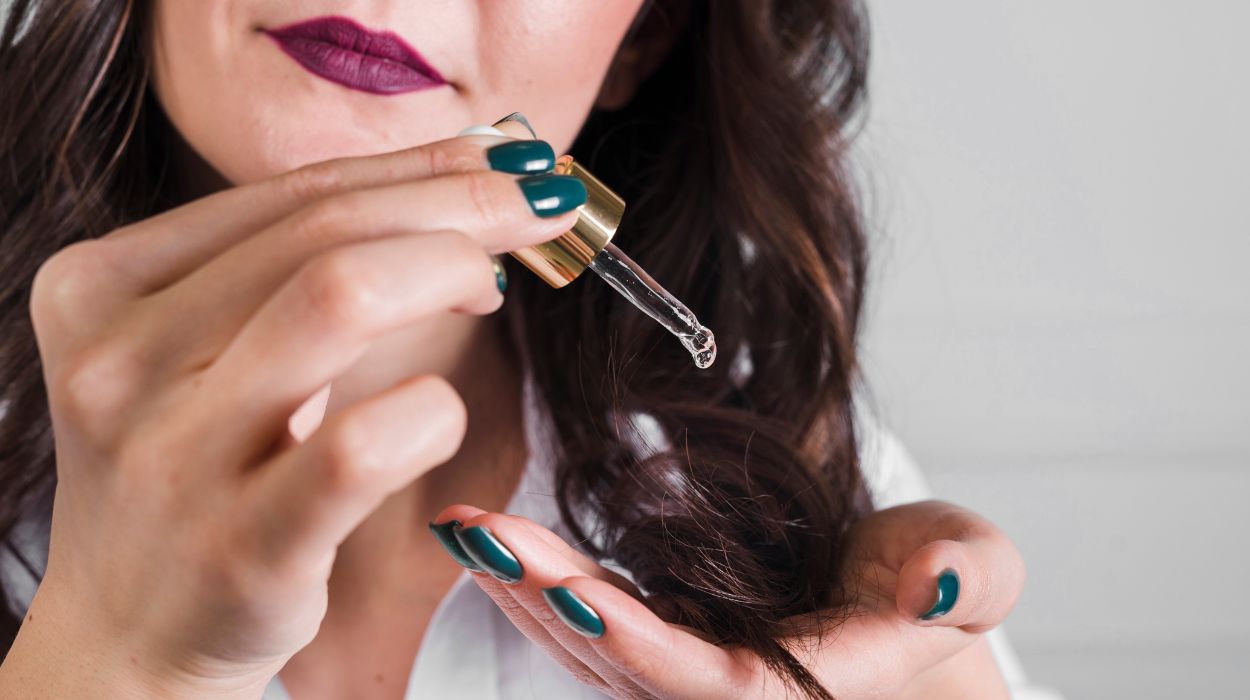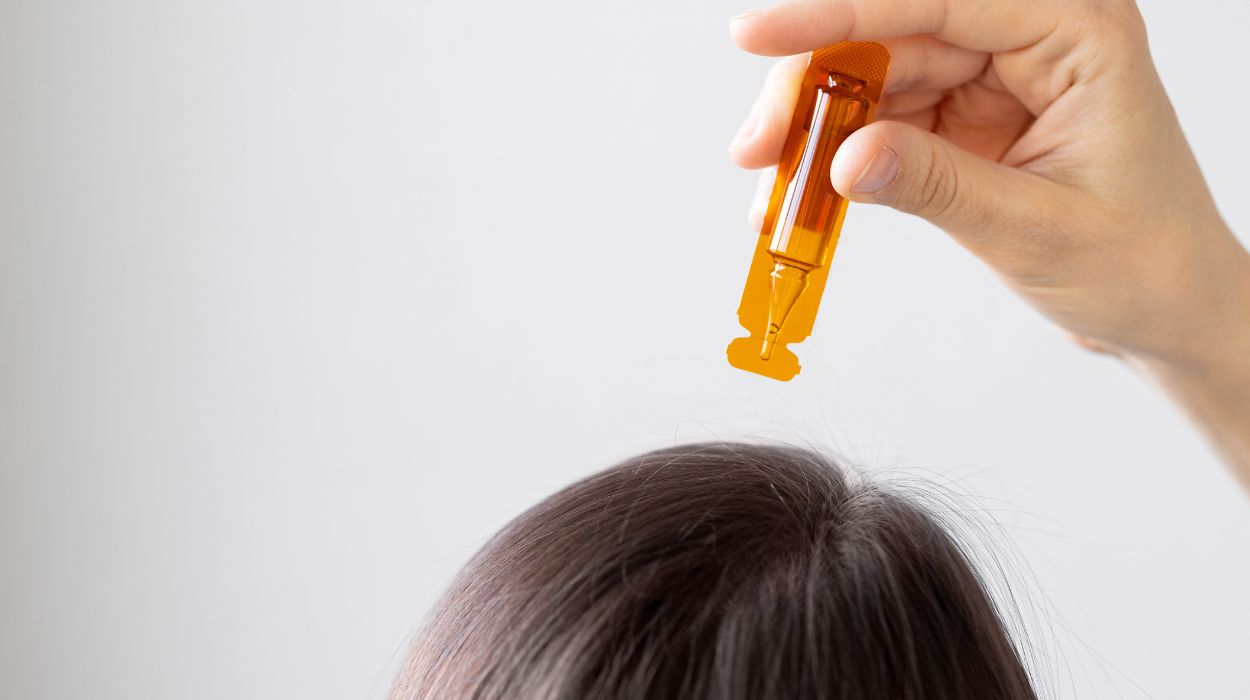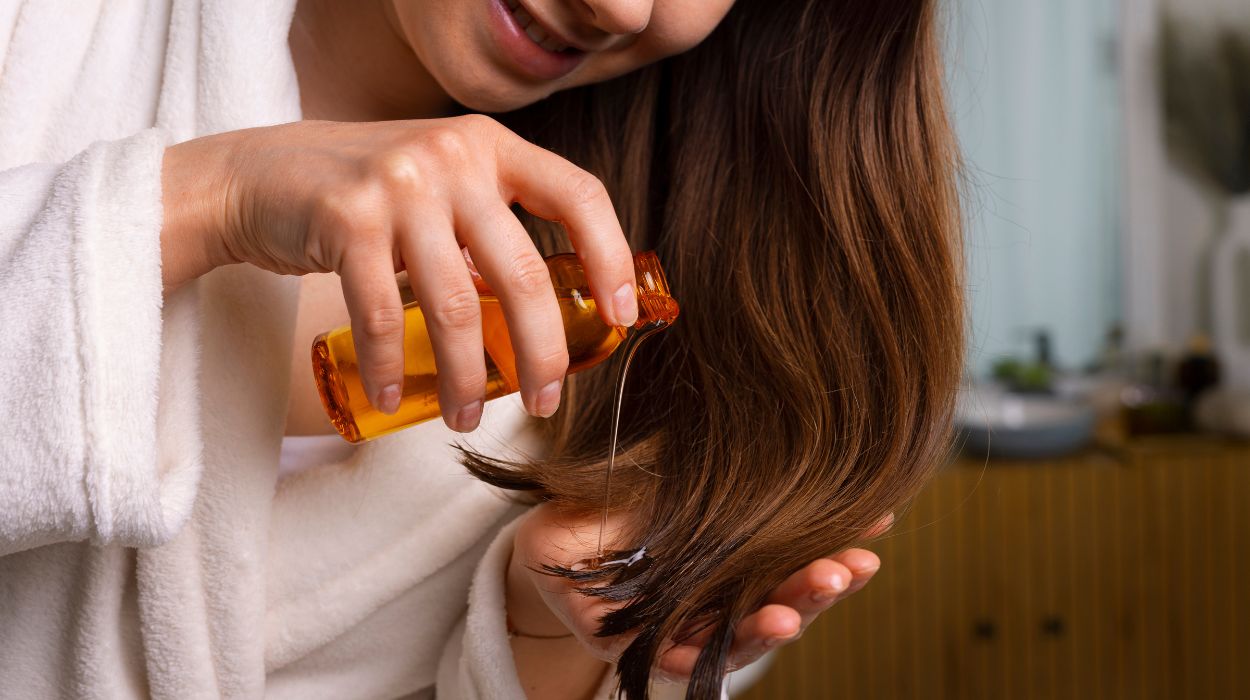 Expert's opinion
Expert's opinion
Expert's opinion
The article is a subjective view on this topic written by writers specializing in medical writing.
It may reflect on a personal journey surrounding struggles with an illness or medical condition, involve product comparisons, diet considerations, or other health-related opinions.
Although the view is entirely that of the writer, it is based on academic experiences and scientific research they have conducted; it is fact-checked by a team of degreed medical experts, and validated by sources attached to the article.
The numbers in parenthesis (1,2,3) will take you to clickable links to related scientific papers.
7 Fish Oil Benefits For Hair & How To Use It Effectively In 2024

While fish oil may offer many benefits to the human body, does fish oil make your hair grow? Fish oil is packed with omega-3 fatty acids and many other essential nutrients, making it a powerful dietary supplement.
Cod liver oil can be a game-changer for those seeking gorgeous hair. The cod liver oil benefits for hair are numerous, from stimulating hair growth to nourishing hair follicles and improving hair density. This article delves into these astounding fish oil benefits for hair.
But that’s not all! We’ll also unveil expert tips on harnessing fish oil’s power through oral omega-3 supplements or targeted topical applications. Prepare to embark on a journey towards stronger, thicker, and more vibrant hair with the extraordinary fish oil hair growth benefits.
7 Amazing Benefits Of Fish Oil For Hair
Here are seven amazing benefits of fish oil for hair:
- Nourishes hair follicles.
- Stimulates hair growth.
- Improves hair density.
- Promotes scalp health.
- Reduces hair loss.
- Enhances hair thickness.
- Regulates sebum production.
These benefits make fish oil a valuable addition to your hair care routine, promoting overall hair health and vitality.
Top Fish Oil Benefits For Hair

So, how is fish oil good for hair? The nutrients in fish oil may support your hair health in the following ways:
Nourishes Hair Follicles
Healthy hair starts with healthy hair follicles. Fish oil is rich in essential omega-3 fatty acids. It contains docosahexaenoic acid[1] and eicosapentaenoic acid, which are crucial for hair follicle health. These fatty acids provide structural support to the follicle cells. A deficiency may lead to[2] hair loss, pigment issues, and loss of hair structure.
Additionally, fish oil contains nutrients like vitamins D,[3] E, and biotin,[4] which have been connected to hair health.
Stimulates Hair Growth
The omega-3 fatty acids found in fish oil have been shown to promote hair growth. These fatty acids stimulate the production of insulin-like growth factor-1[5] and vascular endothelial growth factor.[6] These encourage hair follicle growth[7] allowing nutrients to reach the hair follicles.
Improves Hair Density
Dense hair is advantageous since it gives the appearance of fuller and thicker hair. It enhances volume and gives you a more youthful and brighter appearance. Hair density can improve hairstyles, give better coverage, and promote a healthy-looking appearance.
Fish oil’s ability to improve hair density is attributed to its promotion of the anagen phase. This is the active hair growth cycle of the hair follicles. Omega-3 fatty acids prolong the anagen-stimulating pathways,[1] increasing hair density and more actively growing hair follicles.
Promotes Scalp Health
Inflamed skin is uncomfortable and not conducive to growing healthy hair. A healthy scalp, on the other hand, provides the optimal environment for hair follicles to grow and thrive. A nourished scalp promotes stronger, shinier, and more resilient hair strands.
The anti-inflammatory properties of fish oil, particularly the omega-3 fatty acids[8] EPA and DHA, can help alleviate scalp inflammation, speed up wound healing, and soothe conditions like seborrheic dermatitis[9] and psoriasis.[10] These fatty acids can modulate the inflammatory response in the scalp, reducing redness, itching, and flakiness.
Reduces Hair Loss
Experiencing hair loss alters your appearance. This may lead to feelings of insecurity that affect your quality of life and emotional well-being.
Fish oil’s omega-3s may help reduce hair loss[12] through multiple mechanisms. Fish oil can strengthen hair follicles, decrease shedding, and support a healthy scalp environment, thereby improving overall hair retention.
Enhances Hair Thickness
Hair thinning can impact your self-confidence and overall appearance. It can make the scalp more visible, leading to a loss of volume and fullness and limiting your hairstyle options.
Fish oil’s omega-3s enhance hair thickness by promoting keratin production.[9] Keratin is the protein that forms the hair strand’s structural component, meaning increased availability of omega-3s can lead to stronger and thicker hair.
Regulates Sebum Production
Excessive oil on the scalp can accumulate dirt and buildup that clogs hair follicles. This can hinder natural hair growth and lead to hair thinning, scalp acne, and even infections. An oily scalp may also cause discomfort and an increased need for frequent hair washing.
Fish oil helps regulate sebum production on the scalp by modulating the activity of sebaceous glands.[11] Maintaining optimal sebum levels can prevent excessive oiliness or dryness, balancing the scalp environment.
Does Fish Oil Help Your Hair Grow?

Fish oil can significantly aid in hair growth and mitigate hair loss.[12] The omega-3 fatty acids in fish oil are crucial in promoting hair follicle health and stimulating growth. These nutrients can help nourish the hair follicles from within, leading to stronger and healthier hair strands.
Fish oil also has anti-inflammatory properties that may help reduce scalp inflammation and create a healthy environment for optimal hair growth. Additionally, fish oil helps regulate sebum production and increases blood supply to the scalp. This ensures the hair follicles receive the nutrients and oxygen necessary for healthy growth.
Potential Side Effects & Safety
Fish oil is generally considered safe. Fish oil supplements can be a safe and beneficial addition to hair health when used responsibly. However, you must recognize the potential side effects and consider certain safety precautions.
Some people may have minor side effects such as bad breath,[13] stomach pain, or an unpleasant aftertaste when taking fish oil supplements. Taking fish oil with meals and storing it in the refrigerator may mitigate these effects.
Fish oil supplements may interact with some medications. To reduce the risk of drug interactions, consult your healthcare provider before starting a nutritional supplement. Additionally, you should exercise caution if you have fish or seafood allergies. You may even need to avoid fish oils altogether and consider an alternative source of omega-3 fatty acids.
When choosing fish oil supplements, research reputable brands to ensure purity and quality. Look for third-party testing and certifications to confirm the substance and safety of the product.
Please note that you should not take fish oil supplements in place of expert medical guidance. If you have questions about incorporating fish oil into your regimen, visit your doctor or a registered dietitian. They can provide specialized advice based on your needs and medical history.
How To Use Fish Oil For Hair
What is fish oil good for hair? Consider the following guidelines when using fish oil for hair:
- Choose a reputable brand – When selecting popular dietary supplements like fish oil capsules, choose reputable brands that ensure quality and purity. Look for products that third-party labs have tested.
- Consult a healthcare provider – Before starting nutritional supplements, including fish oils, consult a healthcare provider. Your doctor or registered dietitian can help you find a product and dosage that meets your needs.
- Consider combining with other oils – To maximize its benefits, you can combine fish oil with other products, such as coconut oil. Applying fish oil topically can promote hair growth and add moisture. Also, consider applying fish oil directly to your scalp for better results.
- Follow recommended dosage – Follow the recommended dosing instructions provided on the fish oil supplement packaging unless otherwise directed by your doctor. Avoid exceeding the tolerable upper intake level.
- Take with a meal – It is good to take fish oil supplements with a meal. Doing this aids absorption and minimizes the risk of gastrointestinal discomfort. Also, add fatty fish, olive oil, and other viable sources of omega-3 essential fatty acids to your diet.
- Be consistent – Consistency is key. Incorporate fish oil into your daily routine to experience its potential omega-3 benefits for hair.
- Be patient and monitor results – Since hair grows slowly, it may take time to notice significant changes. Monitor your hair’s response over a few months, keeping an eye on aspects such as hair thickness, decreased shedding, and improved scalp health.
Remember, while consuming fish oil is believed to support hair health, more research is needed to understand its mechanisms fully. If you have specific concerns about thinning hair or excessive sebum production, consider seeking advice from a hair clinic.
The Bottom Line
So, is fish oil good for hair growth? In short, yes.
Adding fish oil into your supplement routine can offer several advantages for hair health and development. Its high concentration of omega-3 fatty acids and other nutrients can nourish hair follicles, stimulate growth, and increase hair density and thickness. Additionally, fish oil for hair growth can combat hair loss and excessive sebum production by enhancing scalp health and lowering scalp irritation.
When incorporating fish oil benefits for hair, use trustworthy products, stick to specified amounts, and speak with an expert. While fish oil is generally safe, it is critical to be aware of potential side effects and take the required precautions. As with any supplement, knowing the effects and the potential pitfalls is critical for your well-being.
Remember that consistency is essential and that results may take time. You may nurture your hair and unlock its full potential for long-lasting, healthy, and luscious locks.
+ 13 sources
Health Canal avoids using tertiary references. We have strict sourcing guidelines and rely on peer-reviewed studies, academic researches from medical associations and institutions. To ensure the accuracy of articles in Health Canal, you can read more about the editorial process here
- Kang, J.-I., Hoon Hahn Yoon, Sung Wan Kim, Jeong Young Park, Yu Jae Hyun, Ko, A., Ahn, Y., Young Hag Koh, Jin Won Hyun, Eun Sang Yoo and Kang, H.-K. (2018). Mackerel-Derived Fermented Fish Oil Promotes Hair Growth by Anagen-Stimulating Pathways. [online] 19(9), pp.2770–2770. doi:https://doi.org/10.3390/ijms19092770.
- Finner, A. (2013). Nutrition and Hair. [online] 31(1), pp.167–172. doi:https://doi.org/10.1016/j.det.2012.08.015.
- Miami.edu. (2023). Available at: https://scholarship.miami.edu/esploro/outputs/journalArticle/The-Role-of-Vitamins-and-Minerals/991031599355702976.
- Patel, D.P., Swink, S.M. and Castelo-Soccio, L. (2017). A Review of the Use of Biotin for Hair Loss. [online] 3(3), pp.166–169. doi:https://doi.org/10.1159/000462981.
- Young, L.E., Kurzer, M.S., Thomas, W., J. Bruce Redmon and Raatz, S.K. (2013). Low-fat diet with omega-3 fatty acids increases plasma insulin-like growth factor concentration in healthy postmenopausal women. [online] 33(7), pp.565–571. doi:https://doi.org/10.1016/j.nutres.2013.04.011.
- Lee, C.-Y., Kuan, Y.-H., Chiang, C.-Y., Wu, C.-N. and Kuan, Y.-H. (2021). Observation of the Expression of Vascular Endothelial Growth Factor and the Potential Effect of Promoting Hair Growth Treated with Chinese Herbal BeauTop. [online] 2021, pp.1–8. doi:https://doi.org/10.1155/2021/6667011.
- Ratchathorn Panchaprateep and Pravit Asawanonda (2014). Insulin-like growth factor-1: roles in androgenetic alopecia. [online] 23(3), pp.216–218. doi:https://doi.org/10.1111/exd.12339.
- Giacobbe, J., Benoiton, B., Zunszain, P.A., Pariante, C.M. and Borsini, A. (2020). The Anti-Inflammatory Role of Omega-3 Polyunsaturated Fatty Acids Metabolites in Pre-Clinical Models of Psychiatric, Neurodegenerative, and Neurological Disorders. [online] 11. doi:https://doi.org/10.3389/fpsyt.2020.00122.
- Huang, T.-H., Wang, P.-W., Yang, S.-C., Chou, W.-L. and Fang, J.-Y. (2018). Cosmetic and Therapeutic Applications of Fish Oil’s Fatty Acids on the Skin. [online] 16(8), pp.256–256. doi:https://doi.org/10.3390/md16080256.
- Adil, M., Pramod Kumar Singh and Maheshwari, K. (2017). Clinical evaluation of omega-3 fatty acids in psoriasis. [online] ResearchGate. Available at: https://www.researchgate.net/publication/318232500_Clinical_evaluation_of_omega-3_fatty_acids_in_psoriasis
- Keen, M. and Hassan, I. (2016). Vitamin E in dermatology. Indian Dermatology Online Journal, [online] 7(4), p.311. doi:https://doi.org/10.4103/2229-5178.185494.
- Caroline Le Floc’h, Ahsène Cheniti, Connétable, S., Piccardi, N., Vincenzi, C. and Tosti, A. (2015). Effect of a nutritional supplement on hair loss in women. [online] 14(1), pp.76–82. doi:https://doi.org/10.1111/jocd.12127.
- NCCIH. (2015). Omega-3 Supplements: In Depth. [online] Available at: https://www.nccih.nih.gov/health/omega3-supplements-in-depth.



